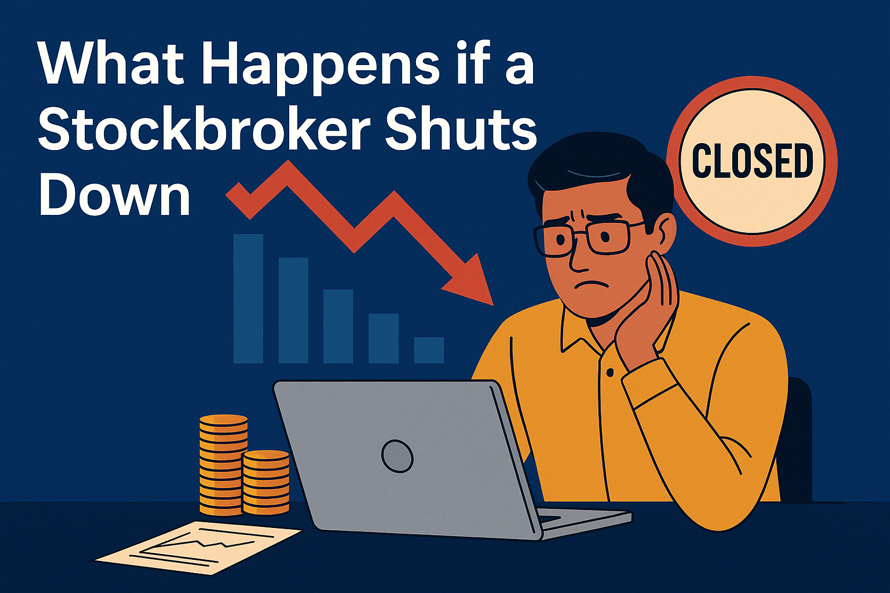What happens if a stockbroker shuts down: Protecting your assets

Introduction
Investing in the stock market can be a great way to build wealth but it is also risky. One of the scariest things that can happen to clients is when a stockbroker shuts down. When this happens, people often wonder if purchases are safe and what they can do to protect their money. Hence, investors need to know what a shutdown like this would mean for their money and what they can do to protect it.
This blog post will discuss what happens when a stockbroker shuts down and what clients should do. Let us understand what happens if a stockbroker shuts down.
Understanding the role and importance of stockbrokers
Stockbrokers are trained professionals in finance who buy and sell stocks based on what their clients tell them to do. They are agents who know how to buy and sell stocks on the stock market and are authorized to do so.
The central part of their job is to get buy and sell orders and carry them out. Market participants, or buyers, use their skills and understanding of how markets work to buy and sell stocks and other investments.
What responsibilities do stockbrokers have towards investors?
A stockbroker acts as a go-between for investors and has the power to buy and sell stocks and other securities on the stock market. Here are some responsibilities stockbrokers have toward investors:
1. Getting Clients and Helping Them
One of the main jobs of stockbrokers is to bring in clients for the trading company they work for. They work in specific areas and teach prospective buyers about different business possibilities. Besides, they help people who want to invest start trade and Demat accounts. They also assist clients in understanding market trends, financial goods, and ways to handle risk.
2. Place Orders and Carry Them Out On the Exchanges
Once stockbrokers have signed up new clients, it is easier for them to place buy and sell orders for them. They ensure that trades are carried out on time and at the best prices possible while keeping things open and running smoothly.
3. Studying and Researching the Market
Sub-brokers study and analyze the market to give their clients sound financial advice. Some of them evaluate the basics of a company, market trends, and economic signs to help clients make wise financial choices. They keep their customers updated on news about the market, study papers, and business possibilities.
4. How Do Stockbrokers Facilitate Trading In India?
In India, stockbrokers mainly act as an interface between the exchange and the investors, like the NSE and BSE. The brokers are authorized and regulated by the market regulator SEBI and can execute transactions on behalf of the client. Stockbrokers provide stock research and recommendations and update the investor with real-time market data to help make informed decisions. They facilitate the trading in many ways, such as:
- Indian stockbrokers ensure that their clients comply with various regulatory frameworks.
- They maintain the required level of transparency in each transaction.
- They also execute post-trade activities such as managing trades, share settlement, transferring shares to the investor’s demat account, and timely transferring funds.
- Many brokers also offer margin trading. Investors who lack enough funds can use borrowed funds to trade, thus increasing their market exposure.
Many investors ask what happens if a stockbroker shuts down. In this case, the rules outlined by SEBI allow clients to be refunded their money. This protects the clients from any risks or disruptions to their investments. Few brokers in the country often offer their clients the facility of trading with leverage. This is the most preferred service by traders.
Immediate steps to take if your stockbroker shuts down
Discovering that your dealer has shut down can be upsetting; therefore, you should understand what happens if a stockbroker shuts down. However, there are organized steps you can take to protect your investments and make sure the transition goes smoothly.
1. Verifying the Status of Your Broker
First, use legal methods to ensure your broker is still active. The Securities and Exchange Board of India (SEBI) updates licensed intermediaries. Stock markets like the NSE and BSE also list brokers in business, and those who have closed down. This check helps determine whether the shutdown is short-term or long-term.
2. Contacting the Securities Exchange Board of India (SEBI) for Guidance
If it turns out that your broker was shut down, contact SEBI for help. SEBI is in charge of the Investor Protection Fund (IPF), which helps buyers get their money back when their broker fails. To file a claim, you need to do all the necessary paperwork. They include:
- Account bills
- Records of transactions
You must file your claim within the stipulated timeframe, usually three years from the event date. SEBI’s website has complete instructions and contact information for people who want to file claims.
Your securities are dematerialized with depositories such as NSDL or CDSL. This means they will be safe even if your dealer leaves the business. However, the money in your trade account could be at risk, which shows how important it is to move quickly. That is why you should have a good understanding of what happens if a stockbroker shuts down.
Protecting your investments
India’s financial scene has changed drastically since the notorious Harshad Mehta scam, in which traders and buyers lost money that agents kept directly. Regulatory systems and institutions today protect your finances in many ways, making you less likely to lose money. Here are two essential safety tips you should know so that you can protect your investment:
• Ensuring the Safety of Stocks in Demat Accounts
Depositories like CDSL (Central Depository Services Ltd.) and NSDL (National Securities Depository Ltd.) ensure the safekeeping of your shares. SEBI has strict rules about these groups. Since your money is not held directly by the broker, it will be safe even if your broker goes out of business.
• Actions to Secure Mutual Funds and Other Assets
Stockbrokers are in charge of your trading account, but don’t have direct access to the stocks or mutual fund units you own. Their only job is to use the money in your trading account to make trades on your behalf. Asset Management Companies (AMCs) hold mutual fund shares, not traders. This means your money is safe even if the company goes out of business.
Conclusion
As a trader, you must understand what happens if a stockbroker shuts down. This is crucial, as otherwise, you won’t be able to safeguard your investment. You must be cautious when it comes to protecting your assets. It is important to regularly review your trade history and monitor your broker’s success and any bad news about them.
Do not worry if you think your trading company is cheating you as an investor or seller. You just have to report it to SEBI or the relevant stock market, and the authority will assist you in protecting your investment.
FAQs
Q. What happens to my stocks if my broker goes bankrupt?
The most important thing to remember is that the exchange does not own your stocks and shares. They are kept in depositories, which are different organizations. So, even if a trader has money problems or goes out of business, these depositories will still safely store your stocks.
Q. Can I transfer my Demat account to another broker?
When you want to move shares from one demat account to another online, you need to follow a few steps. First, visit the CDSL or NSDL websites and sign up for the Easiest or Speed-e service. Next, fill out the form with all the necessary information and send it.
Q. How do I claim compensation from a defunct brokerage?
If something bad happens, request the Investor Protection Fund (IPF), which SEBI created, to release money to compensate you for your loss. SEBI rules say you must claim a settlement within three years to get the money.
Q. What are the signs that a brokerage might be failing?
Be wary if an investment broker calls or emails you out of the blue with investment offers. Genuine brokers rarely resort to methods like these. The sudden pitches are often signs of scams, making false claims to get you to invest in risky or fake things.
Q. Is it safe to keep all my investments with one broker?
Spreading your money out over several trading accounts can help protect you from scams or illegal access. If you have more than one trading account, you can use the best features of each one, mixing and matching the ones you like best.
Disclaimer
The stocks mentioned in this article are not recommendations. Please conduct your own research and due diligence before investing. Investment in securities market are subject to market risks, read all the related documents carefully before investing. Please read the Risk Disclosure documents carefully before investing in Equity Shares, Derivatives, Mutual fund, and/or other instruments traded on the Stock Exchanges. As investments are subject to market risks and price fluctuation risk, there is no assurance or guarantee that the investment objectives shall be achieved. Lemonn (Formerly known as NU Investors Technologies Pvt. Ltd) do not guarantee any assured returns on any investments. Past performance of securities/instruments is not indicative of their future performance.







